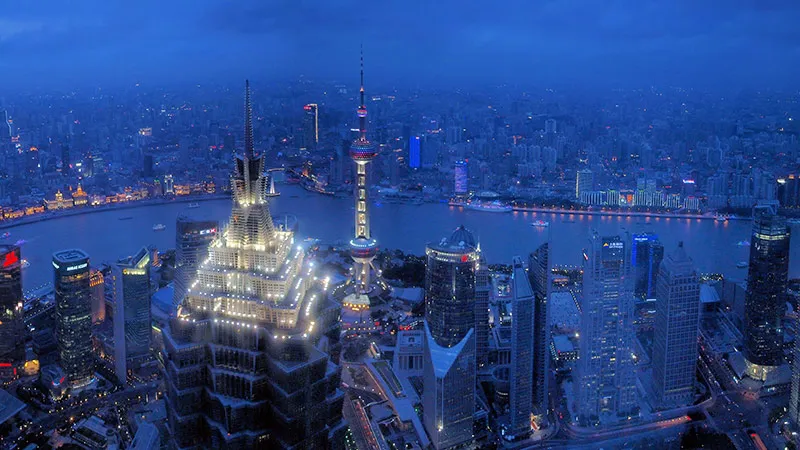 Beijing, November 2016:
Beijing, November 2016: At the Shanghai Cooperation Organisation's (SCO) heads of government meet this week in Bishkek, Kyrgyzstan, China formally proposed the creation of an SCO Bank to promote development and "boost financial cooperation." The proposal, accepted by the six member group, is significant for three reasons:
< style="color: #333333">First, unlike other financing initiatives in the region where China is involved, the Shanghai Cooperation Organisation is a security oriented bloc. The Chinese proposal is interesting because SCO countries are all founding members of the Asian Infrastructure Investment Bank (AIIB) as well, raising questions about the additional purpose that the SCO Bank presumably serves. It is unlikely the SCO Bank's management or lending rates will be any different. But in comparison to the AIIB, Beijing would have considerable flexibility in determining what projects the SCO should fund, thanks to its dominance of the group. Through its proposed creation of the SCO Bank, China has sought to tie its underwriting of economic development in the Eurasian landmass with its strategic goals for the region. The SCO is not ASEAN, but the bloc shares a considerable degree of political and military consensus that would aid the SCO Bank's decision making process.
Through its proposed creation of the SCO Bank, China has sought to tie its underwriting of economic development in the Eurasian landmass with its strategic goals for the region.
< style="color: #333333">Second, the SCO Bank could quickly emerge as a competitor to the BRICS New Development Bank, given Russia's immediate interests in its neighbourhood. Pakistan, absent from the BRICS grouping, may attempt to steer infrastructure development through the SCO, sensing an opportunity to participate in regional projects (say, through an extension of the China-Pakistan Economic Corridor). India, along with Pakistan, will join the bloc formally in 2017 but New Delhi would at best be a junior partner in SCO projects, as opposed to the stature it enjoys in the BRICS grouping.
< style="color: #333333">Third, Beijing has made it clear there is "synergy" between the Belt and Road project (OBOR) and the Eurasian Economic Union, and the SCO Bank may be a carrot for Central Asian states that have so far stayed away to sign up to OBOR. Moreover, Moscow had already
agreed to formally link OBOR to the EEU. The prospect of the SCO Bank becoming a conduit for Russia-China efforts to jointly project economic power in the EEU will ring alarm bells in Western capitals.
What does it mean for India?
The SCO Bank is another reminder that New Delhi should be sensitive to the strategic consequences of Chinese capital investments in Asia. Political influence that accrues as a result of bilateral investment is only one such consequence. If anything, recent attempts by China to gain clout in Maldives, Sri Lanka and Nepal by investing in massive infrastructure projects have shown the limits of this approach. But, entities like the SCO Bank give Beijing room to link project financing with its Silk Route project, and determine the economic outlook of the region. This is perhaps of most concern to India, given that its service-oriented businesses are competitive at the higher end of the supply chain. Were projects like OBOR or the SCO Bank result in captive markets in Central and South East Asia for Beijing, it will be easy for Chinese companies to move up the supply chain once the base infrastructure has been put in place. At that stage, it may be difficult for Indian businesses to influence investment guidelines, industry norms or standards as they relate to the provision of services.
The Alibaba example
A good example is Alibaba, China’s top e-commerce company. Even as Huawei looks to be the dominant supplier of telecom and ICT infrastructure in the region, Alibaba will likely expand its footprint in Russia and Eurasia this decade. It is conceivable that Alipay, Alibaba's payment portal, will be promoted as a fast and efficient way of transacting on the internet — after all, the logistics chain would have been set up by China, and most vendors will be comfortable with a Chinese payment gateway. Would Indian vendors, and innovators in financial technology be crowded out of the market as a result? Would China’s dominance of 'fintech' systems also allow it to mould encryption and data protection norms in the region? Will Indian services that rely on retail outsourcing find that some markets in Asia have been closed to them even before they enter it?
 Courtesy: Alibaba.com via Twitter
Courtesy: Alibaba.com via Twitter
These dire outcomes need not come to pass, but Indian policy planners should be mindful of the potential impact of strategic Chinese investments. The SCO Bank should also be flagged as a competitor to India-led or involved initiatives like the BRICS Bank, which may undermine New Delhi’s role as a economic power in the region. This is not say India should stay away from the SCO Bank. Certain realities remain unchanged: China has plenty of money to pass around; Pakistan will attempt to court Beijing as a site for potential investment; and the Russia-China axis will grow stronger in the years to come. India gets little by staying out of the game. Beijing is certainly keen, both for the sake of legitimacy and for sound market returns, to invest in India. Whether those investments should be coupled with a China-India partnership on larger economic projects is for both capitals to decide. India may have to reconcile with the reality that it will not be an equal partner to Beijing in the design of certain infrastructure projects, but there is no alternative to engagement. By staying out of Chinese-led regional initiatives, India loses a crucial opportunity to secure the future of its own businesses and projects in Asia, and indeed, determine the trajectory of growth.
This is the final of the three part series on China's foreign policy and what its evolution means for India.
Read the first part: What Duterte's comments mean for the South China Sea dispute, and the Indian position
Read the second part: Europe warms up to China’s 'One Belt, One Road' project, raising the stakes for India
The views expressed above belong to the author(s). ORF research and analyses now available on Telegram! Click here to access our curated content — blogs, longforms and interviews.



 Beijing, November 2016: At the Shanghai Cooperation Organisation's (SCO) heads of government meet this week in Bishkek, Kyrgyzstan, China formally proposed the creation of an SCO Bank to promote development and "boost financial cooperation." The proposal, accepted by the six member group, is significant for three reasons:
< style="color: #333333">First, unlike other financing initiatives in the region where China is involved, the Shanghai Cooperation Organisation is a security oriented bloc. The Chinese proposal is interesting because SCO countries are all founding members of the Asian Infrastructure Investment Bank (AIIB) as well, raising questions about the additional purpose that the SCO Bank presumably serves. It is unlikely the SCO Bank's management or lending rates will be any different. But in comparison to the AIIB, Beijing would have considerable flexibility in determining what projects the SCO should fund, thanks to its dominance of the group. Through its proposed creation of the SCO Bank, China has sought to tie its underwriting of economic development in the Eurasian landmass with its strategic goals for the region. The SCO is not ASEAN, but the bloc shares a considerable degree of political and military consensus that would aid the SCO Bank's decision making process.
Beijing, November 2016: At the Shanghai Cooperation Organisation's (SCO) heads of government meet this week in Bishkek, Kyrgyzstan, China formally proposed the creation of an SCO Bank to promote development and "boost financial cooperation." The proposal, accepted by the six member group, is significant for three reasons:
< style="color: #333333">First, unlike other financing initiatives in the region where China is involved, the Shanghai Cooperation Organisation is a security oriented bloc. The Chinese proposal is interesting because SCO countries are all founding members of the Asian Infrastructure Investment Bank (AIIB) as well, raising questions about the additional purpose that the SCO Bank presumably serves. It is unlikely the SCO Bank's management or lending rates will be any different. But in comparison to the AIIB, Beijing would have considerable flexibility in determining what projects the SCO should fund, thanks to its dominance of the group. Through its proposed creation of the SCO Bank, China has sought to tie its underwriting of economic development in the Eurasian landmass with its strategic goals for the region. The SCO is not ASEAN, but the bloc shares a considerable degree of political and military consensus that would aid the SCO Bank's decision making process.
 Courtesy: Alibaba.com via Twitter
Courtesy: Alibaba.com via Twitter PREV
PREV


